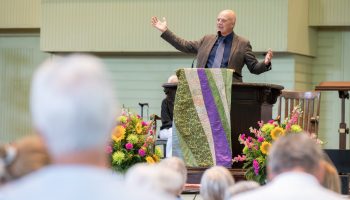
Kaitlyn Finchler
Contributing Writer
Silence can say more than any string of words, and this is especially prevalent in the Jewish faith. While this may seem contradictory to others, as the Jewish faith relies so heavily on words, Rabbi Marc Margolius said the interplay between speech and silence can help shape and create reality.
Margolius, vice president for faculty and program for the Institute for Jewish Spirituality, will lift up the role of silence and stillness in his lecture “Sacred Speech Out of Silence: The Essential Role of Stillness in Jewish Spiritual Practice” at 2 p.m. today in the Hall of Philosophy for the Week Three Interfaith Lecture Series theme “Contemplation: Meditation, Prayer and Silence.”
“Actually, within Jewish tradition, there’s a lot of caution around speech and (a) real importance on refraining from speech in certain situations,” Margolius said.
This relationship can act as a paradox, he said.
On one hand, there’s an idea in the book of Genesis where God brings creation into beings through speech, where it can be a “powerful source” for good, healing and opposing injustice. However, speech can also be destructive, Margolius said.
“There’s even a sense within Judaism that if you malign somebody publicly, it’s as if you murdered them,” he said. “Destroying somebody’s reputation is really the same as shedding their blood, in some ways.
So, the stakes are high with speech. You can do a lot of good, and you can do a lot of damage.”
Living in a society in which the predilection is to speak first, Margolius said it’s important to question the role of silence or pausing before speaking.
“Ensure the speech comes from a sacred place and serves sacred ends, instead of serving your ego or potentially causing unnecessary harm to others,” he said.
There’s also a “beautiful tradition” in Judaism, he said, in which divine revelation takes place in silence. One example is when the Torah was given at Mt. Sinai — it was given in complete silence.
Margolius said he likes to use the term “microdosing Shabbat,” in which he speaks about Shabbat as “sacred pause.”
“There’s an assumption that there’s an innate wisdom that can guide our speech, but that will only happen if we are able to create that pause and build that pause, even if it’s a very short one into our speech or our writing or our communication,” Margolius said.
For example, Margolius said in Jewish literature, there’s a phrase that teaches to watch the words “that come out of our mouths to guard our lips.” He said there’s a tendency to fill in space with sound, words and language, leading to fewer and fewer quiet spaces or moments in life.
“One issue is the question of cultivating the ability to be with silence, because it can make us uncomfortable or it can feel boring,” Margolius said. “We need to entertain ourselves, but in fact, we deprive ourselves of an important spiritual resource of the quiet time that we need in our lives.”
On social media, Margolius said people feel free to say whatever they want, regardless of the implications. This leads to the opposite of mindful speech, to just fill space and have “quick takes” on a topic, rather than pausing to consider what to say or not say.
“Meditation is a mindfulness tool,” Margolius said. “In some ways, it is accustoming oneself to be in silence, whether it’s by yourself or with others, and allow yourself — and practice allowing — whatever feelings or thoughts are present to arise without reacting to it.”
While some may be uncomfortable in silence, he said it’s important to learn to let the mind and body quiet down, calling it a “spiritual necessity” to be still and allow themselves to be still.
“The mindfulness part is actually integrating that into everyday life,” Margolius said. “There’s a greater degree of awareness and intentionality about when to speak, what to say and when to not speak and what not to say in a given situation.”
This all leads to making a conscious choice, he said. Rather than reactively speaking or acting in a way that’s motivated by subconscious emotions and narratives, considering silence is a “much more thoughtful, intentional (and) conscious” way of being a human being and using “the gift of speech” wisely.




